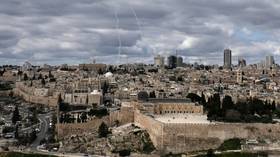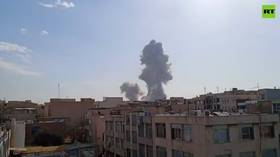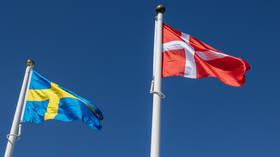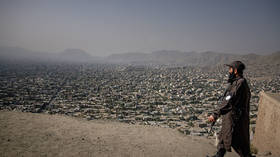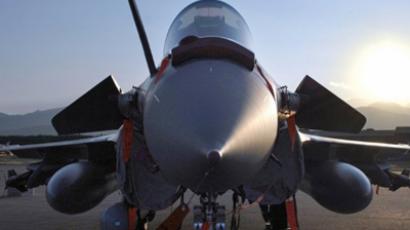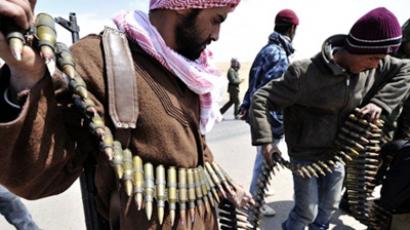Libyan operation continues as hundreds die and thousands flee
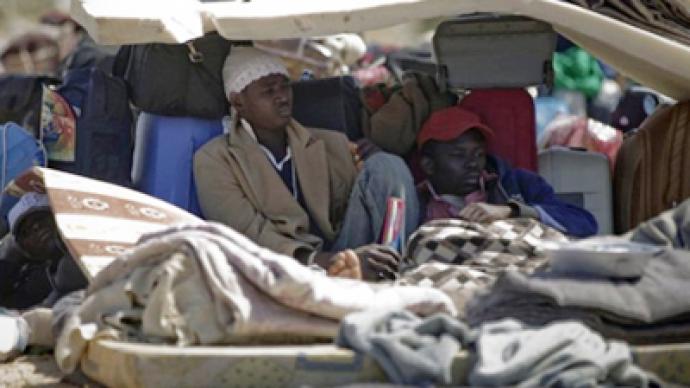
Coalition forces leave Colonel Gaddafi's air defense in tatters, but on the ground tensions remain high; according to reports, at least 114 people have been killed in the first four days of the operation while 300,000 have already fled the country.
Saturday was marked by the rebels gaining control over Ajdabiya – a key gateway to the oil reserves in the country’s east. Unconfirmed reports also claim the rebels have advanced beyond Ajdabiya, toward the town of Brega. The victory marks the first major turnaround in the uprising, and many believe it could not have been achieved without the international air strikes on Gaddafi’s troops.On Friday, British and French planes destroyed Gaddafi’s artillery battery and armored vehicles located in and around Ajdabiya.Saturday, on the outskirts of Misrata, allied aviation initiated an attack on forces loyal to Colonel Gaddafi that had been shelling the city occupied by rebels. Rebel forces had been struggling for over a week to recapture some of the towns in the East that they had lost. But the road to Tripoli is lined with government forces, and the fight on the ground is intense.The US military command claims allied forces are currently focusing on ruining the communications and supply lines between Gaddafi’s military units, not bombing the cities themselves and risking the lives of civilians, AP reports.The rebel’s political front – the Transitional National Council – addressed a letter to the French government, thanking its military forces for their help in containing the loyalist forces.“The people of Libya consider you their liberators,” the statement reads.The letter further relays the rebels’ desire to carry on the fight without international help.However, the question of civilian deaths on the ground remains a major issue. Libyan state television is continuously reporting that the number of civilian deaths stands at more than a hundred, while people in the capital city remain particularly worried.In Tripoli people woke up to fresh explosions amid fears of more bloodshed on Saturday, as three explosions rocked the area in and around the suburbs. For the third straight night the suburb of Tajura was hit. Also, the town of Zliten which is 160 kilometers to the East of Tripoli was hit with air strikes. The coalition air force insists that it is targeting important facilities of Gaddafi's air force.At a short overnight press conference, the Libyan government’s spokesperson announced that at least 114 people have been killed and 445 injured in the first four days of the coalition’s week long series of air strikes. It was unclear whether these deaths and injuries were actually civilians or fighters, and ascertaining exactly who is who on the casualty list remains a problem. The people are frightened of increasing death tolls among civilians and soldiers alike.The American military has announced that the coalition has fired 16 Tomahawk missiles and flown 153 air sorties in the last 24 hours.
NATO to take over coalition leadership
NATO is gearing up to replace the US in leading the campaign in Libya. It has been agreed that the alliance would take control of the mission on Sunday night. The fundamental question as NATO moves forward to lead the coalition is whether or not its involvement will result in an increase of casualties.Russia’s top general, Nikolay Makarov, said NATO might even go so far as to resort to the use of ground troops if it aims to overthrow Gaddafi in the end, because the coalition’s “aerial operation seems to have yielded no results."
Meanwhile, coalition forces have supplied NATO with an additional 25 warships and submarines, as well as 50 fighter jets to help enforce a naval blockade and prevent weapons and mercenaries from entering Libya. The operation, dubbed “Unified Protector”, was launched on Wednesday and involves the UK, US, Canada, Turkey, Italy, Spain, Belgium, Denmark, Netherlands and Greece."The NATO ships will be located in international waters, without entering the territorial waters of Libya. Although the alliance cannot cut off all the roads to this country, it can block the most direct and obvious one – the delivery of weapons to the country by sea,” ITAR Tass news agency cited the statement.
Fabrizio Tassinari from the Danish Institute for International Studies says the operation in Libya is proving to be another key test for the EU and NATO, and there is no sign of how it will conclude.“Definitely there is no clear understanding of what the endgame of this mission is supposed to be,” he says. “The idea of ground troops which has been voiced by some of the coalition forces is not something that was mentioned in the UN Resolution [1973]. So clearly that would be a step beyond what some of the parties, especially from the Arab world would like to see.”“Also, because if the idea of ground troops becomes actual, the objective would become regime change rather than protecting the civilian population. In a way you can argue – if ground troops are not considered, the only other option by enforcing the no-fly zone is really to try and give the opposition a fair chance to overthrow Gaddafi by their own means. So they are in a whole different ball game as to looking at various options of supporting the opposition. But clearly ‘ground troops’ is not one of them, and I think the Libyan opposition or whoever is speaking for them at the moment is has been quite clear about that. They do not want Western ground troops on the ground,” Tassinari concluded.
George Kenney, a former diplomat with the US foreign service thinks that further military intervention from the US might have dangerous consequences.“The stability we’ve promoted has allowed some very unrepresentative regimes to stay in place so that we could get cheap oil. But I think it’s pretty clear that the kind of environment that the US has supported for decades has not worked to the advantage of ordinary people” says Kenney. “I would say, based on our recent track record, that further military intervention is almost certainly going to result in a variety of failures. It’s a very dangerous thing. The larger question is do other governments see the US as having a legitimate democratic system itself. We go around and tell other countries that their governments are illegitimate – to what extent might this question apply here?”
Thousands of refugees flee the country every day
Meanwhile, the humanitarian situation in the region has not improved much so far. Tens of thousands of people are continuing to flee the country each day, looking for safety and better living conditions. According to the UN, over 300,000 people have already left the country.The main flow of refugees is occurring on Libya’s western border with Tunisia, however many people have also escaped to Egypt. People want to stay in bordering countries to see what happens next, waiting for things to settle down. Families fleeing from Benghazi say the humanitarian situation in the city is critical and claim they decided to leave not because their homes had been destroyed, but simply because they did not feel safe anymore. Security has been strengthened in many Egyptian cities on the border with Libya, with soldiers and tanks patrolling the streets and providing law and order. It remains unclear whether the army’s presence is related to the military operation in Libya or the political unrest in Egypt itself.Also, while several weeks ago the Libyan-Egyptian border was being enforced only by the Egyptian side, now it is being patrolled by both countries; there are representatives of the so-called National Police on the Libyan side. Thus, it may seem that the opposition is gaining some control over the country and slowly implementing some discipline. However, judging by the number of refugees, the situation within the country has not improved much and the goal of the military operation, which claimed making the lives of the civilians safer as its objective, has not yet been fulfilled.


